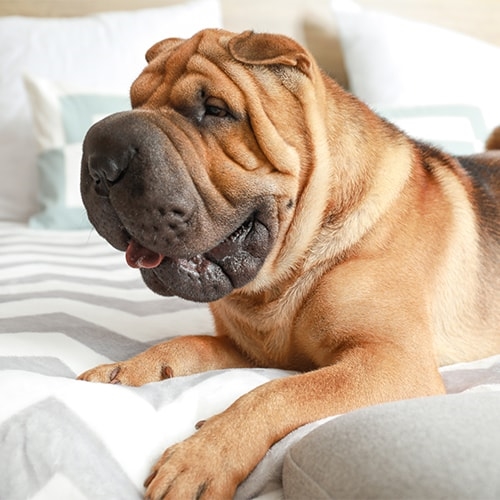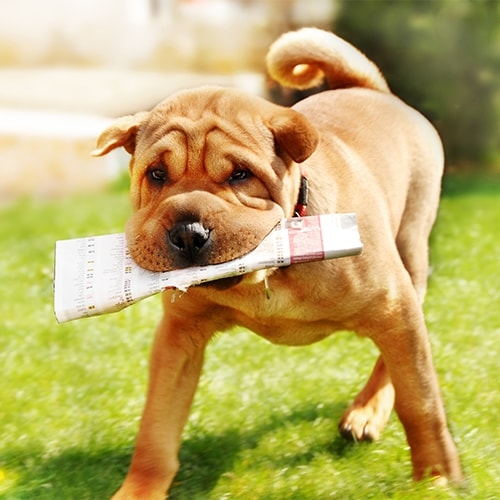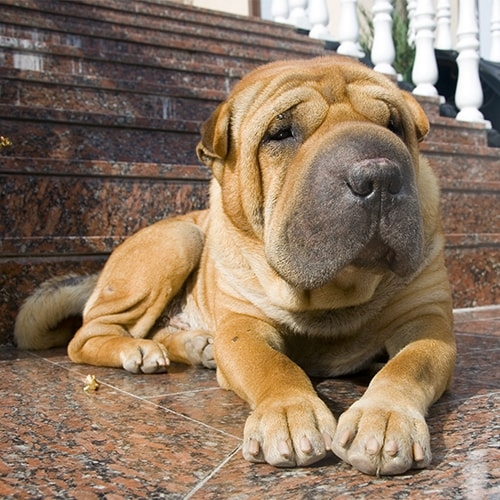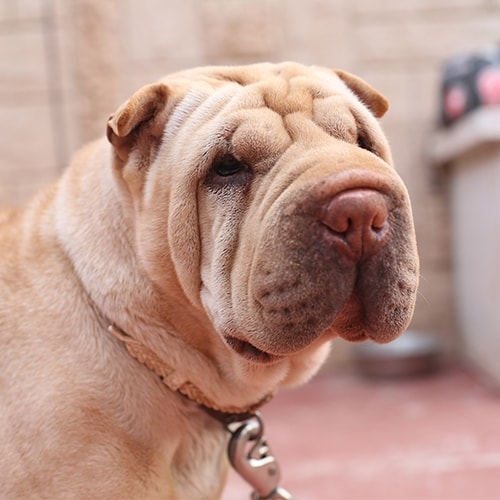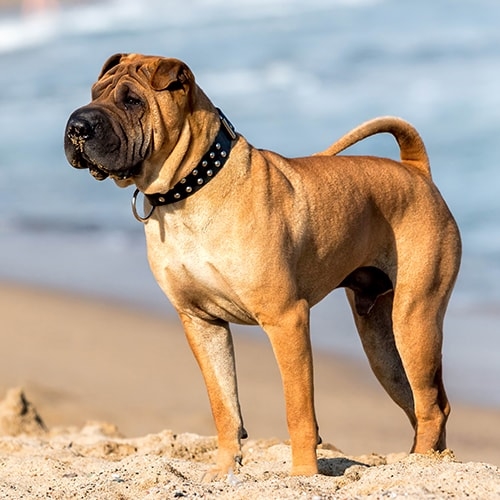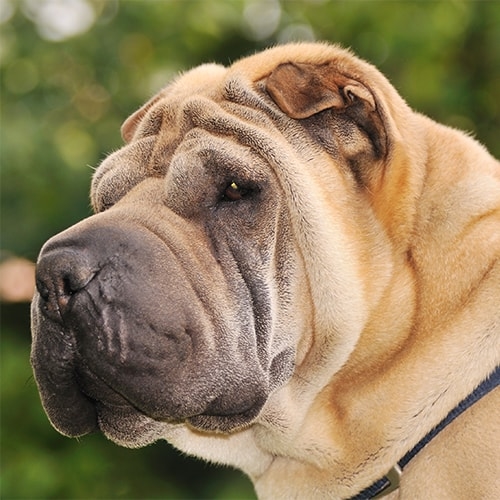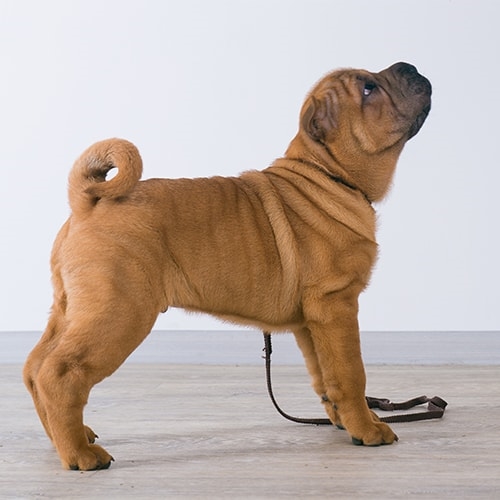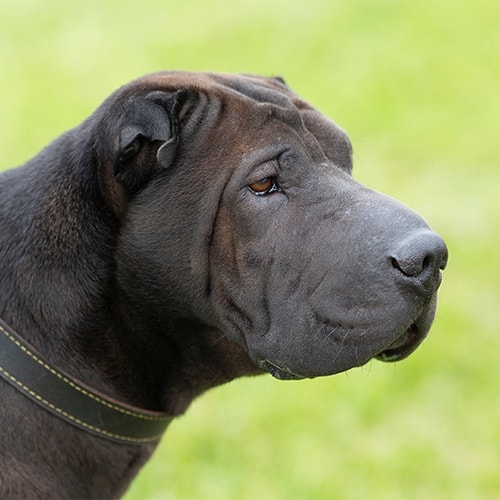| Size | Medium |
|---|---|
| Average height | 46-51 cm |
| Average weight | 20-27 kg |
| Average lifespan | Over 10 years |
| Minimum exercise (per day) | 1 hour |
| Coat length | Short |
| Minimum cost (per month) | £80 |
Shar Peis are loyal and calm dogs with a natural talent for watching and protecting their family and home. They’re a very old breed which originated in China over 2000 years ago and are well-known for their striking looks and natural confidence.
Shar Peis tend to do really well in an experienced household with owners used to the breed as they can be strong-willed. Although they look like they’re frowning, they are actually reported to be full of character, very intelligent and loyal to their families.
Common health problems in Shar Peis
Shar Peis are loving and loyal dogs who form strong bonds with their owners. Sadly, like so many other purebred dogs, they are at risk of certain conditions relating to their breed.
If you are thinking of buying a Shar Pei puppy, make sure the parents of your puppy have had the relevant health screening to reduce the chances of your puppy being affected by certain conditions. We’d recommend looking for a Kennel Club Assured Breeder as they meet extra requirements which will benefit your puppy’s health.
Shar Peis are amongst a group of breeds classed as ‘Category Three’ by The Kennel Club. This is because of their excess skin folds which can cause skin problems and affect their sight. We’d always recommend considering a crossbreed as this may help to reduce some of these problems.
Some of the conditions Shar Peis may develop include:
- Skin problems – such as infections and inflammation between the skin folds.
- Eye problems – where the eyelids can roll inwards (entropion) or outwards. (ectropion) irritating the eye, or conditions such as ‘cherry eye’.
- Ear infections due to their small ear canals.
- Atopy – itchy skin caused by sensitivity to things in the environment (such as pollen, grass and dust mites).
- Familial Shar Pei Fever – a disorder which causes a high temperature, painful swollen joints, swollen face and other symptoms such as vomiting and diarrhoea. If your Shar Pei shows any unusual symptoms you should seek veterinary advice straight away.
- Brachycephalic obstructive airway syndrome (BOAS) – this can cause severe breathing problems and is caused by their flatter face.
If you want to minimise the risk of your dog getting problems due to exaggerated features, you can read our advice on choosing a pedigree dog.
Caring for your Shar Pei
Shar Peis can be wonderful and loving dogs in the right households but owners need to be prepared to meet all their needs. They are naturally protective and make incredibly loyal dogs but their independent attitude means they’re better suited to experienced owners and people more familiar with the breed.
Shar Peis and barking
You should expect some noise from your Shar Pei and how much they make will be down to the individual dog, their personality and their training. This said, Shar Peis are not known to be barkers. They are thought to be fairly quiet, reserved dogs who would rather stand back and assess what’s going on first rather than making a noise about it straight away. If you’re having problems with excessive noise or barking, we recommend seeking the advice of an accredited behaviourist.
Training and socialisation
Shar Peis are known for being very intelligent dogs, but they are also very independent thinkers so starting positive, reward-based training early on is an absolute must. They need a lot of patience and consistency from their owners with clear boundaries from day one (which they will definitely try to push if they can!). Because of this they’re better suited to more experienced owners familiar with their personality quirks. If you are considering a Shar Pei, we would recommend taking them to accredited training classes.
Because Shar Peis have a natural guarding instinct, they can be suspicious and wary of unfamiliar people and dogs. It’s really important to socialise your Shar Pei from a young age with lots of different people, experiences and other dogs to help them grow in confidence.
Shar Peis like to know you’re around so they can protect you, so you should never leave them alone for more than four hours or they may develop separation anxiety.
Exercise
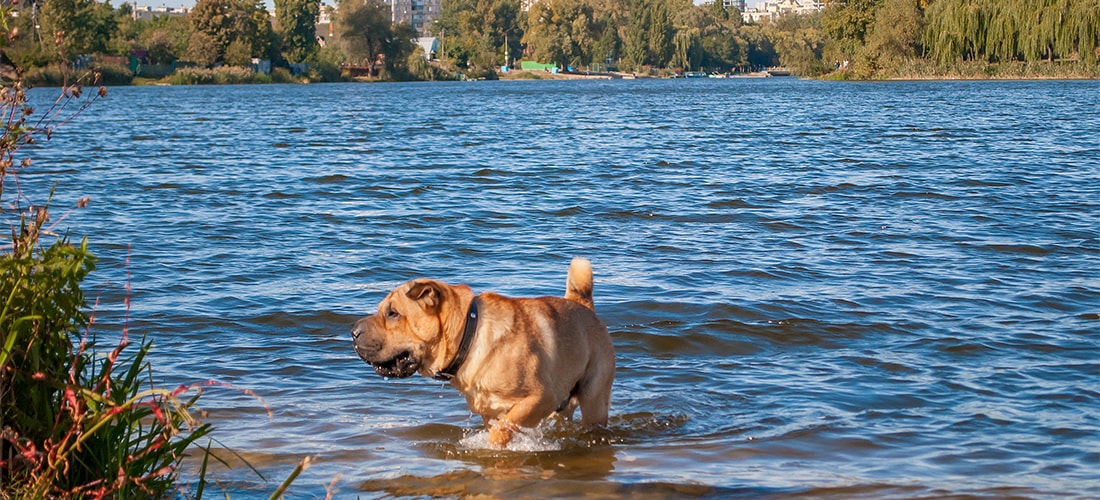
While Shar Peis may not seem very high energy, they still need plenty of varied exercise every day to keep them happy and healthy.
Your Shar Pei will need a minimum of an hour exercise every day. Ideally, this should be split into a couple of good walks with plenty of opportunity to sniff and explore with off-lead exercise in a secure area. As well as this, you’ll also need to do training sessions, lots of playtime and give your Shar Pei free time to mooch around the garden.
Shar Peis are very clever and so if they don’t have enough to keep them occupied they might decide to test your fences. Make sure your garden is fully secure and you have lots of interesting things for your Shar Pei to do. Puzzle games are great fun for Shar Peis.
Grooming
Shar Peis might look like they have soft fur, but don’t be fooled! Their fur has an almost prickly feel, but they are fairly low-maintenance when it comes to brushing. A weekly brush should keep on top of the dead hairs and a regular hoover should be enough to keep on top of their shedding around the home.
Although their fur isn’t high maintenance, you’ll need to pay close attention to your Shar Pei’s skin folds. They need to be kept clean and dry to stop them developing something called skin fold dermatitis. It’s best to clean them with a damp cotton wool pad then dry them thoroughly afterwards. You’ll also need to regularly monitor their ears to check they’re clean, the skin doesn’t appear sore and there is no build-up of dirt.
In general, Shar Peis are clean dogs so you’re unlikely to need to give them a bath.
Shar Peis and children
Shar Peis are devoted and loyal family pets and can get along well with older children given the right socialisation. We wouldn’t recommend getting a Shar Pei if you have younger children as they can be such independent dogs who prefer to do their own thing at times (which young children might not understand).
Remember to make sure you can recognise your dog’s body language so you can put a stop to any potentially stressful situations before they escalate. Always supervise your dog with children and vulnerable adults.
Shar Peis and other pets
Because of their protective nature, you might find your Shar Pei is naturally wary of unfamiliar dogs and would prefer to keep their distance. It’s really important to socialise them from a young age so they know other dogs are nothing to be cautious of. If you are getting a Shar Pei puppy, remember to take them to puppy socialisation groups.
Shar Peis have a really high prey drive, so we wouldn’t recommend keeping one with smaller pets. You’ll also need to keep a tight grip on their lead out and about in case they get the urge to chase something!
Food
Your Shar Pei’s diet will vary depending on their age. You’ll need to feed them a complete, balanced dog food to keep them slim and healthy.
Your vet will be able to tell you how much your Shar Pei should be eating. You should feed them a good quality, commercially available, complete dog food. We usually recommend splitting their daily allowance into two meals. If you give your dog the occasional treat or use treats for training, remember to take this into account and reduce their daily allowance. Treats shouldn’t make up more than 10% of their daily calorie intake as this can unbalance their diet.
Remember to leave a gap between eating and exercising.
The cost of owning a Shar Pei
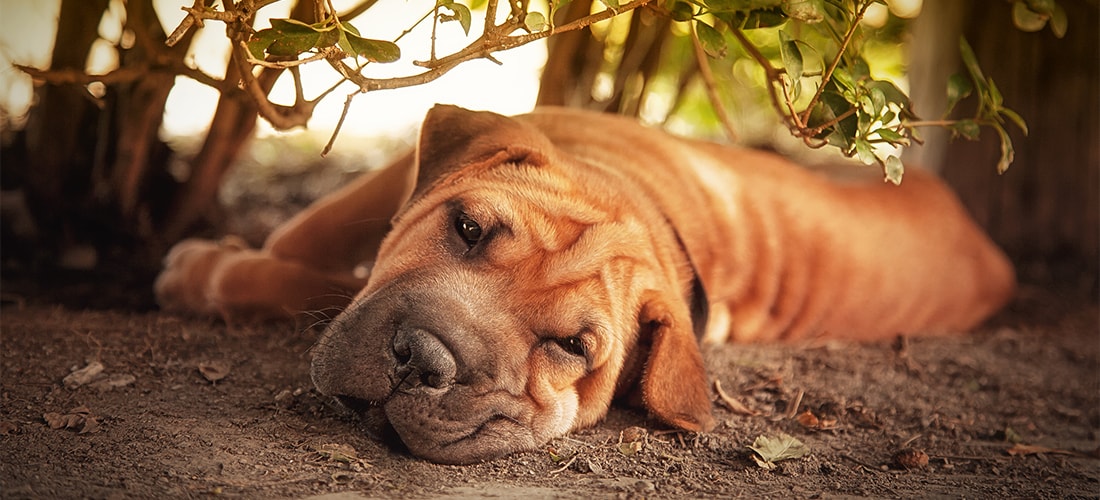
You can expect your Shar Pei to cost you a minimum of £80 per month after purchase and set-up costs and over £13,000 across their lifetime.
Costs you’ll need to think about include:
Purchase costs
Adopting an adult Shar Pei from a rescue centre may be a more cost-effective option, with the added advantage of giving a home to a pet without one – check if the rehoming centre you’re looking at asks for a donation for rehoming.
If instead you’re buying a Shar Pei puppy from a breeder, you’ll need to factor in this cost. Beware unusually cheap puppies as they could come from a puppy farm. If you’d like to buy a pedigree puppy, we recommend looking for a Kennel Club Assured breeder. These breeders must do extra health tests and meet higher standards.
Set-up costs
- Puppy vaccines – if you rescue a dog, reputable centres will often vaccinate them for you. Remember that ongoing booster vaccinations will be needed to continue their immunity.
- Neutering – you should usually arrange for your dog to be neutered at around six months old, though your vet will be able to advise you exactly when is best. Check prices at your local practice as these will depend on your vet and where you live. Some rescue centres will neuter any dogs they rehome, saving you this cost.
- Equipment – including a collar and tags, lead, harness, dog beds, dog bowls, pet-safe toothpaste and toothbrushes, grooming brushes and toys. Keep in mind that all these will need to be replaced with wear or damage or if your dog outgrows or damages them!
Ongoing costs
- Food.
- Preventive healthcare – budget for routine vet visits to help stop your dog getting ill and catch any problems early. They need annual check-ups, vaccinations and regular flea and worming treatments. Check if your vet offers a health care plan as this can help spread the cost throughout the year.
- Vet bills* or pet insurance – if you don’t have pet insurance and your dog needs veterinary treatment for an injury or illness, costs can rapidly mount up. Check what’s covered and what isn’t when comparing policies.
- Accessories – including lots of poo bags, replacing worn toys and grooming accessories, buying doggy toothpaste and any other extras they might need.
Other costs
- Training – basic training is very important and dogs can benefit from formal classes. Some dogs may have, or develop, behavioural problems which might need professional management.
- Boarding – you may also need to budget for boarding or dog sitting costs if you are planning to go away from home on holiday.
- Dog walkers/day-care – you might consider a professional dog walker to keep your dog happy and healthy if you’re unable to get out with your dog enough yourself, or to look after them during the day if you need to be out for more than four hours.
* It’s always better to plan ahead and budget or get pet insurance in case your pet gets injured or unwell. If you are having difficulty with veterinary costs, you can check if you are eligible for treatment at PDSA here.
If you’re considering pet insurance, our PDSA Pet Insurance could be a great option for you and it’s quick and easy to get a quote online.
Fun facts
- While they will be affectionate to everyone in their household, Shar Peis are known for picking a favourite person.
- Shar Peis are a Chinese breed believed to share ancestry with the Chow Chow.
- Their tongues are either black-blue or a lavender colour depending on the colour of their fur.
- Their name translates as ‘sand skin’ because they are usually a sandy colour and their fur is surprisingly rough.
Getting a Shar Pei
Do plenty of research before getting a Shar Pei. These protective pooches make loyal pets but need lots of care and commitment in return. In the right household, Shar Peis can really thrive and easily become their owner’s best friend.
Rehoming centres
There are plenty of rescue centres across the country where you may find a Shar Pei. Breed-specific rescues that specialise in Shar Peis are also out there. You’ll need to ask any rescue centre about the dog’s history to make sure they will be comfortable in your home. Good rescue centres should let you know of any health and behaviour problems.
Breeders
If you buy from a breeder, make sure your puppy will be well socialised and have all necessary screening tests, health checks and vaccinations. It’s really important that Shar Pei puppies from a breeder get the right early socialisation so always ask the breeder about how they go about this. We recommend looking for a Kennel Club Assured breeder as they meet higher standards. We’ve put together some advice to help you find a good breeder.

